This is a guest blog post by Ryan Carey, of My 3 Quotes.
We’ve all seen some epic battles over competing products in which parts of the ad campaign relied on going after the competition. Pepsi vs. Coke, Chevy vs. Ford, or today’s PC vs. Mac and I-Phone vs. Android are just a few. While those have played out on the national stage, home improvement product battles take place with the contractors, builders, or with you at your kitchen table. The current battle of paintable composite siding boards has given rise to quite the rivalry between LP SmartSide and James Hardie. These two really don’t like each other; they make the Vikings/Packers rivalry look pretty tame in comparison. And like Vikings/Packers, the front line of this battle is taking place in the Twin Cities because this is one of the top remodeling and building markets in the nation.
Why Use Paintable Composite or Engineered Wood Boards?
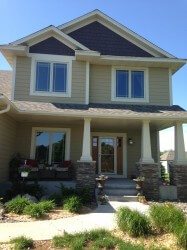 After thousands upon thousands of houses were done in “maintenance-free” siding like aluminum, steel, and vinyl, a demand for more traditional looking paintable products started to build in the 90’s and into the 2000’s. Most customers wanted the wider 6″ or 7″ exposure to differentiate from all the 4″ vinyl out there. However, these new products needed to perform much better than earlier hardboard products, which had the problem of swelling and falling apart in high moisture areas. Some were basically sawdust and glue. Customers also wanted to stay away from the expense and regular refinishing needed with real cedar.
After thousands upon thousands of houses were done in “maintenance-free” siding like aluminum, steel, and vinyl, a demand for more traditional looking paintable products started to build in the 90’s and into the 2000’s. Most customers wanted the wider 6″ or 7″ exposure to differentiate from all the 4″ vinyl out there. However, these new products needed to perform much better than earlier hardboard products, which had the problem of swelling and falling apart in high moisture areas. Some were basically sawdust and glue. Customers also wanted to stay away from the expense and regular refinishing needed with real cedar.
Modern composite boards were the answer for millions of homeowners. They got the traditional look they wanted with a vastly improved resistance to moisture. One advantage of these boards over maintenance-free products comes when it is time to sell the house. A fresh coat of paint can make the product look brand new again if it had experienced some fading over time. Also, these types of products stand up much better to hail and other impact than vinyl, aluminum, or steel.
Hardie Takes Over
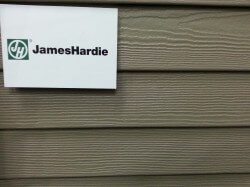 An Australian company, James Hardie, stepped in to the market with their “fiber cement” product and began killing it in the 90’s. Many new neighborhoods were built with a Hardie covenant, meaning every house must be sided in Hardie. Building plans with more traditional looks were calling for Hardie every time. It could be purchased primed (to be painted on the house) or it could be ordered pre-finished with one of their “Colors Plus” colors. Despite some other fiber cement products on the market, like “Certainteed Weatherboards” or the Japanese “Nichiha,” the term “Hardie Board” became known as the generic term for “Fiber Cement,” much like “Kleenex.” They were working with little competition, and the customers were loving the look of the product.
An Australian company, James Hardie, stepped in to the market with their “fiber cement” product and began killing it in the 90’s. Many new neighborhoods were built with a Hardie covenant, meaning every house must be sided in Hardie. Building plans with more traditional looks were calling for Hardie every time. It could be purchased primed (to be painted on the house) or it could be ordered pre-finished with one of their “Colors Plus” colors. Despite some other fiber cement products on the market, like “Certainteed Weatherboards” or the Japanese “Nichiha,” the term “Hardie Board” became known as the generic term for “Fiber Cement,” much like “Kleenex.” They were working with little competition, and the customers were loving the look of the product.
While contractors had complained about Hardie’s service with certain warranty issues, they were in no position to switch to anything else. As a response to some of the delamination issues that came up in high moisture areas or as a result of it being installed incorrectly, Hardie re-formulated their product a few years back for the northern climate and named it HZ5. It has improved the overall performance of the product. Also, I have heard that the reps have been more receptive and helpful with warranty claims than they once were. Could the reason for this be that a certain competitor has been taking large bites out of its market share? Enter LP SmartSide.
Here Comes LP Smartside
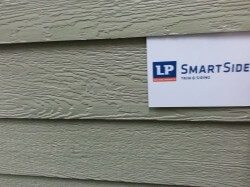 LP (Louisiana Pacific) SmartSide came into the marketplace in 1997 with barely a blip on the radar. LP had just gone through the fiasco of their earlier Oriented Strand Board (OSB) siding product, Inner Seal, which had major problems. It was plagued with rot and swelling, and once that process started the paint would no longer hold. LP had to settle a class action lawsuit and resolve homeowners’ claims. Obviously, the focus of their next siding panel would be resistance from moisture. They still use OSB product, but all of the wood flakes are coated in zinc borate beforebeing pressed into siding with MDI resins and marine waxes. The result? More than 7 billion square feet of siding sold and over 17 years of dependable performance. I’ve not had to deal with one warranty claim on this product.
LP (Louisiana Pacific) SmartSide came into the marketplace in 1997 with barely a blip on the radar. LP had just gone through the fiasco of their earlier Oriented Strand Board (OSB) siding product, Inner Seal, which had major problems. It was plagued with rot and swelling, and once that process started the paint would no longer hold. LP had to settle a class action lawsuit and resolve homeowners’ claims. Obviously, the focus of their next siding panel would be resistance from moisture. They still use OSB product, but all of the wood flakes are coated in zinc borate beforebeing pressed into siding with MDI resins and marine waxes. The result? More than 7 billion square feet of siding sold and over 17 years of dependable performance. I’ve not had to deal with one warranty claim on this product.
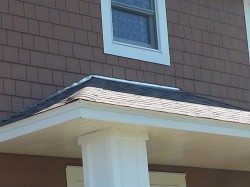
The confidence in moisture resistance also shows in their install specifications. LP can be installed 1″ up from where a roof line meets a wall; Hardie requires a 2″ gap to maintain warranty. The 2″ gap requirement leaves installers with a challenge to put something in that gap that looks better than exposed shiny aluminum flashing. Some paint the aluminum only to have it peel later. Others use a small trim board made of a PVC-heavy composite. The image to the right shows aluminum flashing in the gap from the roof line to the Hardie shakes.
When I first saw LP SmartSide, I was pretty skeptical of an OSB siding product based on the history. It took seeing moisture tests and demonstrations for me to become a believer. If you pour water on the back side of each product, it will absorb into the Hardie while staying beaded up on the SmartSide. There is a lumber desk employee who had a piece of SmartSide submerged in a pail of water by his chair- when people asked about how it handles moisture, he would pull it out of the pail and show them how it stayed intact.
LP Advantages
This is why LP SmartSide has resonated like it has with contractors and builders. Once the contractors believed in the product, the information was passed to the homeowners, including the following advantages: LP SmartSide has superior moisture protection and strength, longer lengths than Hardie (16′ over 12′), less weight than Hardie, and is less expensive to install (no special cutting tools needed). Most importantly, contractors weren’t spending their time on warranty claims. LP has quietly won over more contractors, builders, and homeowners every year. LP had its eye on showing advantages to James Hardie from day one. Hardie now fully realizes the threat that LP poses to them, and is aiming a lot of marketing material back at their foe.
Hardie has a video on their website showing an “OSB product” delaminating, rotting, and falling apart. That product on the house, of course, is the old Inner Seal that had the class-action lawsuit, but Hardie is trying to generate as much doubt into any OSB product as possible to slow down Smartside’s rise. They also have an 11-point siding check list based on Hardie vs. a “wood-based” product. I love these checklists that include phantom products! LP SmartSide would have actually scored really good on that check list. Of course the unnamed “wood-based” product (that must have all the worst attributes of anything ever made with wood) only got credit for 2 token positive marks on the list, I believe for “not melting” and “not causing childhood obesity.”
LP has many marketing pieces on comparisons of SmartSide vs. “fiber cement,” which you can also find on their website. They recently posted an impact test done by NASA, showing LP with much greater impact resistance than fiber cement. Which fiber cement? Not sure, since they never name each others’ brands on these comparisons. I’m guessing the legal department has its concerns with that, but I would love to see them start to call each other out by name in a WWE-style tirade.
Hardie Advantages
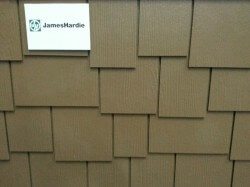 Hardie is non-combustible, ASTM-rated for fire protection, which is a property of being a fiber cement product. Also, Hardie has the huge advantage of more name-brand recognition. That is still a battle that LP is fighting, and they have been putting more money into it in the last few years. They have relied more on contractor word-of-mouth, but lots of LP radio ads have helped their branding lately. They are also the corporate sponsor of LP field, where the Tennessee Titans play. Their corporate headquarters are in Nashville, and they do have a Minnesota plant up in Two Harbors. Despite that, Hardie had a big jump on LP by being the name that gets mentioned in every composite board conversation. Customers have asked over the years, “Do you carry Hardie Board?” Only recently have customers started to ask for SmartSide by name.
Hardie is non-combustible, ASTM-rated for fire protection, which is a property of being a fiber cement product. Also, Hardie has the huge advantage of more name-brand recognition. That is still a battle that LP is fighting, and they have been putting more money into it in the last few years. They have relied more on contractor word-of-mouth, but lots of LP radio ads have helped their branding lately. They are also the corporate sponsor of LP field, where the Tennessee Titans play. Their corporate headquarters are in Nashville, and they do have a Minnesota plant up in Two Harbors. Despite that, Hardie had a big jump on LP by being the name that gets mentioned in every composite board conversation. Customers have asked over the years, “Do you carry Hardie Board?” Only recently have customers started to ask for SmartSide by name.
For another Hardie advantage, I’ve always thought Hardie’s shakes look better than the LP shakes. Putting shake siding in the peaks (or gables) of 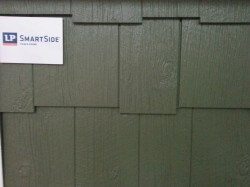 houses has been a very popular way to dress up the front of the house for curb appeal. Hardie’s shake has a laid back cape cod look on both their straight-edge and staggered edge version. LP makes more of a bold, hand-split rustic shake for an up-north look. The look of the shake is all about personal preference, but I have had others share my opinion on that. I’ve had customers of mine do LP on the house and combine it with Hardie shakes in the gables. I’ve also had customers do Hardie siding and combine it with LP corner posts, since LP corners have a cedar woodgrain and the Hardie corners only come in smooth (same with window trim boards). Products from bitter rivals on the same house? Happens quite a bit, actually. For the siding boards themselves, LP has a little deeper woodgrain than Hardie, but they are both designed to look like cedar and they both do a pretty darn good job.
houses has been a very popular way to dress up the front of the house for curb appeal. Hardie’s shake has a laid back cape cod look on both their straight-edge and staggered edge version. LP makes more of a bold, hand-split rustic shake for an up-north look. The look of the shake is all about personal preference, but I have had others share my opinion on that. I’ve had customers of mine do LP on the house and combine it with Hardie shakes in the gables. I’ve also had customers do Hardie siding and combine it with LP corner posts, since LP corners have a cedar woodgrain and the Hardie corners only come in smooth (same with window trim boards). Products from bitter rivals on the same house? Happens quite a bit, actually. For the siding boards themselves, LP has a little deeper woodgrain than Hardie, but they are both designed to look like cedar and they both do a pretty darn good job.
Prefinishing Options
Hardie is the only one that comes prefinished from the manufacturer, with the Colors Plus process that has a 15-year warranty. Both Hardie and LP can also be prefinished through a number of different outlets that are arranged through the contractor. Any color under the sun can be put on your home. Prefinishing warranties have improved over time, and two of my favorite prefinishing options are from Prefinished Staining Products and Diamond Kote. Prefinished carries a Lifetime paint warranty for the lifetime of the existing homeowner that includes an excessive fade warranty. DiamondKote from Wausau Supply offers the only 30 yr no-fade warranty in the industry, and has a very impressive paint process. It must be noted, however, that these products have a bit of a shine to them so make sure you look at the samples before signing off.
And the winner is…
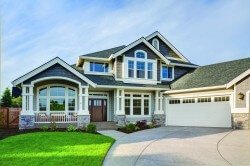 LP SmartSide. I used to work at a large contractor that sold installed services for both products. All of the 10 sales reps that worked there recommended LP over Hardie to customers, despite the fact that the Hardie job would be a higher ticket sale. Again, this is what happens when contractors believe strongly in a product and have good experiences with the reps from that company. With My 3 Quotes, I can collect quotes for customers using any siding on the market. When asked for my opinion on LP vs. Hardie, I simply tell customers that I believe LP has more advantages and you’ll pay less. That’s not to say that I don’t think they are both great products; I’ve had many happy customers with each one. Some like the look of one woodgrain over the other and that makes their decision. Some are more comfortable because they have heard of Hardie and they like the name brand recognition. Others may have been referred by a friend or neighbor and want whatever they have.
LP SmartSide. I used to work at a large contractor that sold installed services for both products. All of the 10 sales reps that worked there recommended LP over Hardie to customers, despite the fact that the Hardie job would be a higher ticket sale. Again, this is what happens when contractors believe strongly in a product and have good experiences with the reps from that company. With My 3 Quotes, I can collect quotes for customers using any siding on the market. When asked for my opinion on LP vs. Hardie, I simply tell customers that I believe LP has more advantages and you’ll pay less. That’s not to say that I don’t think they are both great products; I’ve had many happy customers with each one. Some like the look of one woodgrain over the other and that makes their decision. Some are more comfortable because they have heard of Hardie and they like the name brand recognition. Others may have been referred by a friend or neighbor and want whatever they have.
However, the SmartSide advantages easily tip the scales in their direction for me and for many others in the industry. That is why this battle is very intense at this stage. There are contractors talking about Hardie getting more competitive with pricing and even trying to “buy back” home builders they have lost to LP. In other words, offering a big lump of cash up front for builders to switch back to Hardie. LP SmartSide is using its competitive advantages in an effort to de-throne King Hardie, and obviously the King doesn’t plan on going down without a fight. It’s been truly amazing to watch SmartSide go from a product that few ever mentioned in contractor circles 10 years ago to a royal pain for Hardie today. It will be interesting to see how the battle plays out from here, but a good competition like this is always great for the end customer. When two companies badly want to earn your business over the other, you typically see a renewed emphasis on better service and competitive pricing.
Related Post: Problems with James Hardie Siding Installations
 Ryan Carey has 15 years of experience in exterior remodeling for Twin Cities Homeowners and Property Management Companies. He is the owner of “My 3 Quotes,” a company that provides the free service of collecting 3 competitive home improvement bids for customers. For more information, visit www.getmy3quotes.com for free home improvement estimates on window replacement, siding, roofing, and more.
Ryan Carey has 15 years of experience in exterior remodeling for Twin Cities Homeowners and Property Management Companies. He is the owner of “My 3 Quotes,” a company that provides the free service of collecting 3 competitive home improvement bids for customers. For more information, visit www.getmy3quotes.com for free home improvement estimates on window replacement, siding, roofing, and more.

Don Hester
June 17, 2014, 8:00 am
Reuben, I do not know what you see on your area but I tend to see much more issues with the LP products versus the Hardie products. Maybe my climate is the reason for it.
I have run into Hardie delamination on very few homes where as I run into smartside swelling quite often on homes that are not very old. Some of this is installation but some of it is the product just does not stand up as well.
I will start paying even closer attention to the Smatside to see if the even newer stuff is holding up better.
Reuben Saltzman
June 17, 2014, 2:01 pm
@Don – ditto what Ryan said. I haven’t encountered a single issue with Smartside yet.
Ryan Carey
June 17, 2014, 10:03 am
Hi Don, I wouldn’t think the climate in the state of Washington would be too much different in moisture levels from Minnesota, but we’re sure not having any issues here. Every time I’ve seen swelling from an OSB siding, it has been from the Inner Seal product. I’ve never seen the SmartSide swell. One way to identify is to look for the 2 1/4″ round knot that is in the woodgrain of the Inner Seal product.
Whitby Real Estate
June 21, 2014, 12:14 pm
Great info. I will be looking into LP SmartSide for an up coming project.
Thanks.
Josh Darnell
July 8, 2014, 9:21 am
Is there a way to identify LP and Hardie when looking at the siding? They both look very similar in appearance.
Thanks for the article.
Ryan Carey
July 8, 2014, 9:57 am
Josh- If you look at the pictures above of the two panels, you will see that LP has more of a rough edge woodgrain to it. It looks more like rough sawn cedar. Hardie has the same basic woodgrain pattern, but the lines don’t have the rough edges. When in doubt, grab a small sample piece of both from a local distributor and put it up against the house in question. You will be able to identify it that way.
Mark Brandon
July 15, 2014, 11:23 pm
Great blog!
I do agree with other commentators here that LP is more advance and relevant than Hardie. As you explain in your blog. I can’t agree more. You nailed it!